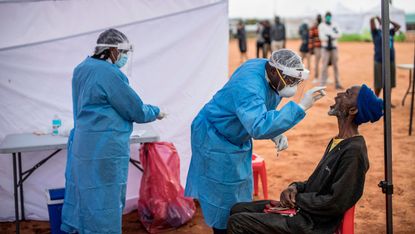What South Africa can tell us about the future of Covid
Cases are rising again as new sub-variants emerge

Experts believe a new Covid surge in South Africa could offer clues to the pandemic’s next chapter.
Following a decline in cases after an “Omicron-fuelled, pandemic peak in December”, the number of infections there has tripled over the past week, and hospitalisations have increased, reported The New York Times (NYT).
The new spike, which has prompted fears of a fifth wave in the country, is powered by BA.4 and BA.5, two sub-variants of the Omicron family. An expert said this might point to a period of new sub-variants, rather than fresh variants.
Subscribe to The Week
Escape your echo chamber. Get the facts behind the news, plus analysis from multiple perspectives.

Sign up for The Week's Free Newsletters
From our morning news briefing to a weekly Good News Newsletter, get the best of The Week delivered directly to your inbox.
From our morning news briefing to a weekly Good News Newsletter, get the best of The Week delivered directly to your inbox.
“What we are seeing now, or at least maybe the first signs, is not completely new variants emerging, but current variants are starting to create lineages of themselves,” Tulio de Oliveira, director of South Africa’s KwaZulu-Natal Research and Innovation Sequencing Platform, told the NYT.
Scientists said the body’s ability to fight the new sub-variants depends on your vaccination status more than on whether you’ve been infected in the past. In unvaccinated people, BA.4 and BA.5 evade natural defences produced from infection with the original Omicron variant, known as BA.1.
Meanwhile, experts are still establishing whether the new wave in South Africa creates milder or more severe illness. They say it is unclear if the two sub-variants could surge elsewhere in the world.
“We’re at an awkward global moment where the past can’t really predict the future,” said Dr Kavita Patel, a primary care physician who led the pandemic preparedness response for the swine flu virus.
Sign up for Today's Best Articles in your inbox
A free daily email with the biggest news stories of the day – and the best features from TheWeek.com
However, writing on Twitter, Professor Tom Wenseleers of KU Leuven, said the situation in South Africa “gives a good idea of what the endemic equilibrium will look like: a significant wave every six months with significant mortality and morbidity”.
In the UK, government data on the most dominant variants showed there were just six cases of BA.4 and three of BA.5. The most prevalent variants in new cases were the original BA.1 Omicron variant and BA.2.
Professor Christina Pagel, of University College London, told The Guardian it is “very likely” the new sub-variants will become dominant here, adding at best this would lead to a small wave and at worst a similar experience seen with BA.1 and BA.2.
Meanwhile, UK experts have predicted that within a year we might talk about “catching a Covid” just as we do with the common cold.
The i news site reported that, as people build up immunity from vaccines and previous infections, the virus has weakened to become more cold-like in recent weeks.
Professor Karl Friston, a virus modeller at University College London, said “the probability of dying when infected – or developing an acute respiratory distress syndrome – continues to decline with successive viral mutations”.
However, Covid remains deadly for some people and there is still a risk that immunity levels will deteriorate and that a much more deadly new variant will emerge.
Create an account with the same email registered to your subscription to unlock access.
Chas Newkey-Burden has been part of The Week Digital team for more than a decade and a journalist for 25 years, starting out on the irreverent football weekly 90 Minutes, before moving to lifestyle magazines Loaded and Attitude. He was a columnist for The Big Issue and landed a world exclusive with David Beckham that became the weekly magazine’s bestselling issue. He now writes regularly for The Guardian, The Telegraph, The Independent, Metro, FourFourTwo and the i new site. He is also the author of a number of non-fiction books.
-
 Nigeria's worsening rate of maternal mortality
Nigeria's worsening rate of maternal mortalityUnder the radar Economic crisis is making hospitals unaffordable, with women increasingly not receiving the care they need
By Harriet Marsden, The Week UK Published
-
 'Elevating Earth Day into a national holiday is not radical — it's practical'
'Elevating Earth Day into a national holiday is not radical — it's practical'Instant Opinion Opinion, comment and editorials of the day
By Harold Maass, The Week US Published
-
 UAW scores historic win in South at VW plant
UAW scores historic win in South at VW plantSpeed Read Volkswagen workers in Tennessee have voted to join the United Auto Workers union
By Peter Weber, The Week US Published
-
 Nigeria's worsening rate of maternal mortality
Nigeria's worsening rate of maternal mortalityUnder the radar Economic crisis is making hospitals unaffordable, with women increasingly not receiving the care they need
By Harriet Marsden, The Week UK Published
-
 Dengue hits the Americas hard and early
Dengue hits the Americas hard and earlySpeed Read Puerto Rico has declared an epidemic as dengue cases surge
By Peter Weber, The Week US Published
-
 Covid four years on: have we got over the pandemic?
Covid four years on: have we got over the pandemic?Today's Big Question Brits suffering from both lockdown nostalgia and collective trauma that refuses to go away
By Chas Newkey-Burden, The Week UK Published
-
 How happy is Finland really?
How happy is Finland really?Today's Big Question Nordic nation tops global happiness survey for seventh year in a row with 'focus on contentment over joy'
By Harriet Marsden, The Week UK Published
-
 The hollow classroom
The hollow classroomOpinion Remote school let kids down. It will take much more than extra tutoring for kids to recover.
By Mark Gimein Published
-
 How Tehran became the world's nose job capital
How Tehran became the world's nose job capitalUnder the radar Iranian doctors raise alarm over low costs, weak regulation and online influence of 'Western beauty standards'
By Harriet Marsden, The Week UK Published
-
 Africa's renewed battle against female genital mutilation
Africa's renewed battle against female genital mutilationUnder the radar Campaigners call for ban in Sierra Leone after deaths of three girls as coast-to-coast convoy prepares to depart
By Harriet Marsden, The Week UK Published
-
 Excess screen time is making children only see what is in front of them
Excess screen time is making children only see what is in front of themUnder the radar The future is looking blurry. And very nearsighted.
By Devika Rao, The Week US Published